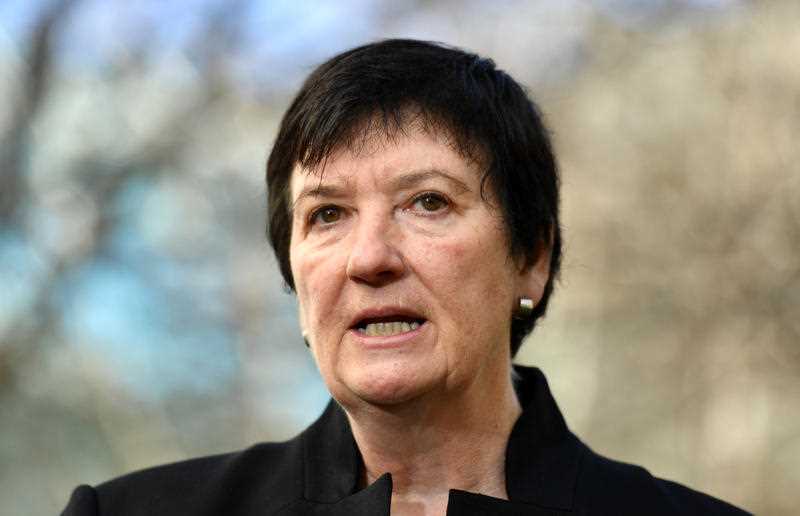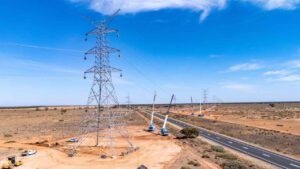
The Business Council of Australia, the country’s pre-eminent business lobby group, has effectively declared war on wind and solar technology, declaring that a target of 49 per cent renewables, as proposed by Labor, would “wreck the economy.”
In echoes of the Minerals Council of Australia’s extraordinary campaign against the mining tax under the Rudd government, BCA chief executive Jennifer Westacott vowed to campaign against Labor’s renewable energy target, which she said would “destroy” the Australian economy.
The threat from the big business lobby group came on the same day as the BCA joined with the Minerals Council, the Australian Industry Group and others, all of whom had urged former prime minister Tony Abbott to dump the carbon price five years ago, to get in behind the National Energy Guarantee.
The NEG, according to modelling provided by the Energy Security Board, will result in little or no new investment in wind and solar over the decade between 2020 and 2030, an assessment supported by the latest data released by analysts at Green Energy Markets.
GEM suggests that Australia will source one-third of its electricity needs from renewables by 2020 – far beyond the 23.5 per cent estimated just a few years ago – thanks to the surging household market and booming corporate demand.
“Even if contracting and construction commitments to solar farms and wind farms halted from today, ongoing installations of rooftop solar should see renewables share reaching 39 per cent by 2030,” GEM analyst Tristan Edis says.
“Given a range of corporate procurement tenders are also underway it is now reasonably likely renewables will exceed 40 per cent share by 2030.
“This substantially exceeds the emission reduction ambition within the National Energy Guarantee (NEG). Modelling for the Energy Security Board estimated the emission target would be achieved with 36 per cent renewables share.”
His assessment of the NEG was echoed by Bloomberg New Energy Finance, whose analyst Leonard Quong told the Large Scale Solar and Storage Conference, co-hosted by RenewEconomy and Informa in Sydney, that while the mechanism looked workable, the targets were “totally inadequate.”
“There will be almost no new investment beyond what will happen anyway,” Quong said, in reference to the current 26 per cent reduction target.
Ironically, GEM’s assessment and Westacott’s threats came a day after BCA chairman Grant King, the former CEO of Origin Energy, told an audience at a conference at the Crawford School that 28 per cent renewables was about as far as Australia should go.
According to some people present, King’s position was contradicted by Bill Armstrong, from GE – the biggest supplier of energy systems in the world, which is now shifting its focus towards renewables and away from fossil fuels.
The ANU’s Andrew Blakers, agreed with Armstrong that the transformation to a renewables-dominated grid would be quicker than most people imagined.
But such is the deep-set denial among Australian conservatives – in the corporate sector, in the media, and in politics.
But while the Coalition government says coal may be part of the energy mix “for ever”, and reports insist that some plan is being cooked to keep power plants open, India has just announced that it is aiming to have renewable supply 55 per cent of its capacity by 2030.
Westacott’s position also appears untenable given that many of the country’s largest energy consumers are turning to wind and solar to provide all or a significant part of their electricity needs in order to reduce costs.
This include GFG Alliance’s steel works in Whyalla, Laverton, and eventually in NSW, the Orora packing giant, Mars Australia, Carlton & United Breweries, and the Sun Metals zinc refinery. More corporates are pursuing contracts with wind and solar farms, mostly without any subsidies.
The position by the BCA, the Ai Group, the Minerals Council, and the Farmers Federation, with BHP and Bluescope in tow, deepens the suspicions that having destroyed the most sensible policy – the carbon price – the lobbyists are now seeking to lock in failure with the NEG.
The federal Coalition government is seeking to make it impossible to change its low-ball target before 2030, and is now being pressured by internal dissent to make special measures that could encourage new coal fired generation, or extend the life of existing generators.
The NEG is being painted as a solution to the bipartisan nature of climate and energy politics, however it is anything but, because the emissions and renewables targets of the two mainstream parties are so far apart.
“This … is the most workable scheme we have been working on for a long time,” Westacott said, according the AFR, after meeting with Coalition back-benchers led by Abbott and energy committee chair Craig Kelly to enlist support for the NEG.
Maybe that’s because it is a scheme that is designed to do nothing.
Ai group’s Innes Willox had the hide to say: “To kill this off really would be wrecking-ball politics.”
This is the very same Willox who, even when Labor was in power in 2013, was leading the call to kill the carbon price, and applauding Abbott’s repeal when it was finally achieved in 2015.
That helped create the mess the country currently finds itself in, but it wasn’t enough for the big business lobbies who also sought to kill the renewable energy target, and only succeeded in having it reduced.
The Guardian, quoting sources in the Coalition party room, quoted Westacott as telling the assembled throng that an emissions reduction target of 26 per cent in electricity by 2030 was not easy to meet.
This is just nonsense.
According to assessments from the likes of GEM, S&P, and any number of other groups, that target will largely be met by 2020, and easily exceeded by 2030, because of the RET (that the BCA and other business groups sought to destroy), and installations from households and business.
Indeed, it makes you wonder how companies such as Origin, now under the leadership of Frank Calabria, which is calling for more ambitious emissions targets, and to make them more flexible, could remain a member given that energy is so fundamental to its business and the country’s economic and environmental future.
Other members of the BCA include AGL, EnergyAustralia, Engie, Snowy Hydro, Jemena, and network operator Ausgrid. And News Corp.








